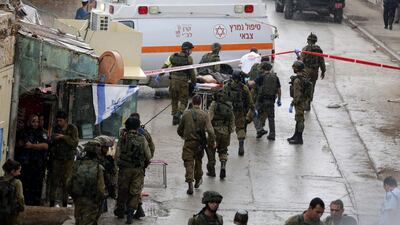East Jerusalem // Israel’s refusal to return the bodies of Palestinians killed by security forces in recent violence is a form of collective punishment that blocks the proper investigation of their deaths, Palestinian leaders and rights groups said.
Israel is holding on to the corpses of 26 Palestinians, who they say had tried to attack Israelis since tensions over the Al Aqsa mosque complex erupted this month. As further punishment for the families, the Israeli government has threatened to bury their bodies in military cemeteries in Israel.
The withholding of the bodies is part of a series of measures introduced by prime minister Banjamin Netenyahu’s hardline government in an attempt to stem the unrest that has killed 59 Palestinians and 10 Israelis.
Instead, the measures, which include setting up roadblocks and checkpoints in occupied East Jerusalem, demolishing Palestinian homes and threatening to revoke residence, seem to be stoking the violence.
Saeb Erekat, secretary general of the Palestine Liberation Organisation, called on Israel to return the bodies to their families.
“All humanitarian law sources stipulate that the remains of persons who died due to causes related to the occupation, or in detention resulting from occupation, or in hostilities, should be respected,” he said.
“Israel has been doing this for decades ... They killed them, why would they punish their families also?”
Mr Erekat said Israel was using “the guise of security concerns” to do what it wanted with the bodies.
“For Islam the body must be buried as soon as possible for several reasons, including the dignity of the person. It is telling that the Israeli government is not willing to respect the dignity of Palestinians, even after they are killed,” he added.
One of the bodies being held is that of 16-year-old Mutaz Awiesat from Jebel Mukaber in occupied East Jerusalem. He was shot dead by Israeli border police on October 17, in the nearby Jewish settlement of Armon Hanatziv. Israeli police said he pulled out a knife and tried to stab a security guard. The guard was uninjured.
“We still don’t know what happened to him, we haven’t seen his body,” said Mutaz’s uncle Mohammed Awiesat. “We are human, we are not animals – we all feel sad that they won’t release his body.”
The family are in disbelief over the allegations that the teenager had tried to stab anyone.
“We were shocked, it seemed so unbelievable. Mutaz couldn’t stab a hen, or a cat, let alone a soldier in the middle of the settlement,” Mr Awiesat said.
Mutaz was from a prominent, wealthy Palestinian family and was well-educated. His neighbourhood has suffered heavily under the extra Israeli restrictions introduced on October 16. Eleven of the Palestinians killed after allegedly trying to attack Israelis were from East Jerusalem, of which five were from Jebel Mukaber.
Mr Awiesat said Israel’s refusal to hand over his nephew’s body amounted to a degrading collective punishment that was fuelling Palestinian anger.
Withholding the bodies of Palestinians accused of attacking Israel is not a new tactic. Last year, an Israeli court ruled that the bodies of 38 Palestinians killed in the 1970s and buried inside Israel should be returned to their families.
The Jerusalem Legal Aid and Human Rights Centre, which spearheaded the legal case, said there are still 262 missing bodies. Israel said there are 119 Palestinian bodies that are still held, or buried in Israeli military cemeteries.
“This policy is really about preventing a proper investigation of how each of them was shot; if they were shot lethally aiming to kill, or shot to wound,” said Rafat Sub Laban, advocacy coordinator for Addameer Prisoner Support and Human Rights Association.
The organisation has already taken one of the recent cases to court to demand an autopsy, but the request was denied “on the ground that they are terrorists and they were lawfully killed”, said Mr Sub Laban.
Not allowing the families to bury their dead also plays into Palestinian suspicions that Israel is trying to encroach on the Al Aqsa Mosque compound in Jerusalem’s Old City which contains sites holy to both Muslims and Jews.
Sheikh Adil Awiesat, a religious leader in Jebel Mukaber and a relative of Mutaz, said he believed underpinning Israel’s decision to hold on to the bodies was a disregard for Islam.
“They don’t respect our religion and sooner or later their attitude needs to end. The Prophet Mohammed said to respect the dead is to bury them,” he said.
A spokesman for Mr Netanyahu said the decision to hold on to the bodies was taken by the security cabinet approximately two weeks ago.
“These funerals often serve as a catalyst for incitement and further violence, and it is our intention to de-escalate,” he said.
Israel claims around half of the Palestinians killed in recent weeks were carrying out attacks. Many were killed taking part in demonstrations.
Elsewhere in Jebel Mukaber, another family is awaiting the return of a body.
Earlier this month, Israel demolished the homes of two Palestinian cousins after the pair attacked a synagogue last year, killing six.
Their cousin Alaa Abu Jamal saw the houses of his family being destroyed and followed in their footsteps, carrying out an attack on October 13 in which he ran over a 60-year-old man in central Jerusalem and then stabbed him to death.
Alaa’s father Daoud Abu Jamal sat alone in a cavernous mourning tent waiting for the body of his 33-year-old son.
He told The National the shock of his death had led to a stroke. One side of his face hangs with the weight of his grief and he now walks slowly with a stick.
“I think not releasing his body is a strange tactic; we can’t say goodbye and it’s punishing us, his family. Haven’t we already been punished enough?”
foreign.desk@thenational.ae

